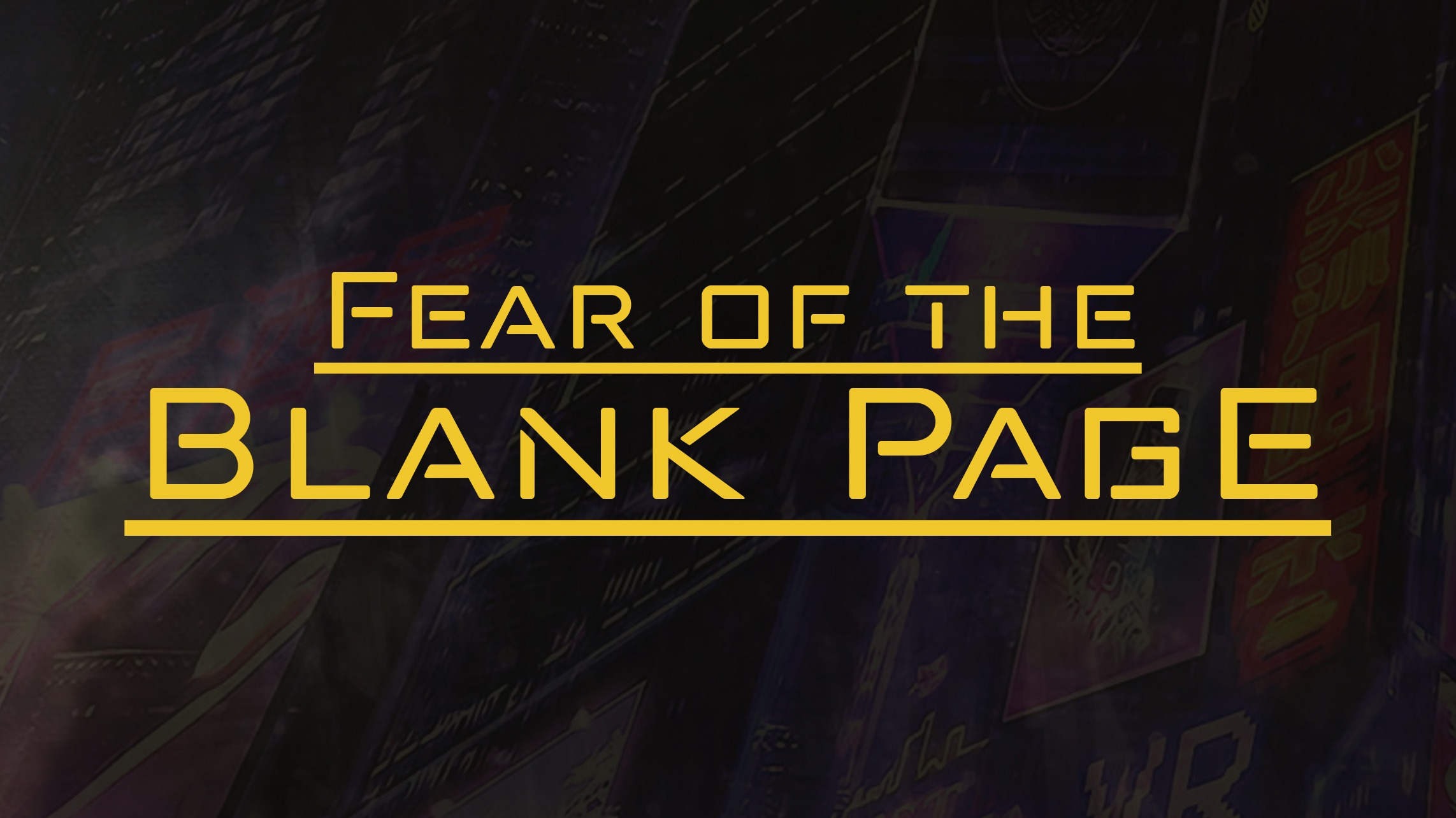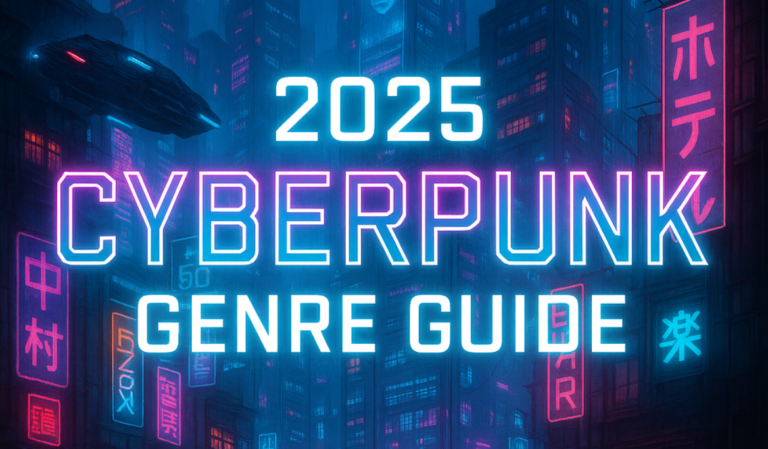Does this ever happen to you:
You’re sitting in front of a big, empty screen, with nothing but a cursor flashing back at you like Sonic the Hedgehog tapping his foot. You know you have to start, but you’re frozen. All the ideas are bouncing around your head, but you’re struggling to manifest them in words.
If this scenario sounds familiar, I want to help you conquer fear of the blank page and eliminate the dread that often comes with starting a new piece of work.
We’ll begin with a few proven tips for defeating this common writing hang-up.
Tip 1: Don’t stare at a blank page!
If blank pages are scary, why would you ever want to look at one? If you’re a writer who struggles with this phobia, I’d recommend skipping the blank page.
You think about your books before you write them, right? Then why not plan out the first few paragraphs in your head before you even sit down?
This gives you the bonus effect of one of my internal rules of writing: if an idea isn’t strong enough to remember without writing down, it probably sucks.
WARNING: I would not apply this rule to everyone. I have a very good memory for certain things. One of them is writing ideas. The other is important conversations. It drives my girlfriend nuts that I remember almost every word she’s ever said to me, even though I tried explaining that ‘well, that just means I think everything you say is important’. Didn’t work.
I think anyone serious about writing should be able to plan out a paragraph or two in their head. Do so, then fire up the word processor. Then start writing immediately.
Do not revise!
If you get sucked into that black hole, you’re just hurting yourself. See below:
Tip 2: Stop trying to make your first paragraph a hook!
Now that I’m actively critiquing other writers again, I’m seeing this phenomenon on a daily basis. I call it “the try-hard opening”.
Either the first paragraph is so far up its own butt with flowery prose that I can’t even understand it, or it’s all written in service of what the author believes is the big, groundbreaking line that will forever secure their place in literary history.
Whichever it is, it reads forced, and it’s terrible.
We all know that we need our books to hook readers. Unfortunately, that desire can become an obsession — especially when a writer thinks it has to involve a sentence that’s both mysterious and unique and compelling. (A tour de force!)
When that happens, they tend to get really hung up on summarizing the story’s premise. The first paragraph becomes an elevator pitch for the rest of the book instead of part of the story.
And that’s a bad thing when it feels detached and forced. I’ve yet to see someone succeed at hitting those desired notes completely out of context.
Make no mistake. In the first paragraph, everything will be out of context for the reader. They know nothing. Which means that it’s very, very hard to be unique, compelling, and mysterious without confusing the heck out of them.
I went back and counted, and I’ve reviewed seven manuscripts in the past week which could have been vastly improved just by cutting their first one-to-three paragraphs. I’m talking about huge improvements here, simply by hacking out the intro.
Why? Because of everything I just told you. As a reader, I can feel the struggle these writers put themselves through to try and force these “awesome” opening paragraphs. They’re clunky. They’re out of context. They serve the author’s agenda, but do nothing for the reader.
They’re try-hard!
Take a look at your first page. What would happen if you cut the first paragraph or two? Would the story actually suffer?
Tip 3: Just start the story.
Getting hung up on the first paragraph is a self-inflicted problem. If I went into every new story thinking “I have to nail this amazing intro”, I’d be scared, too. If you face this issue yourself, just change your perspective a little.
I don’t think about the first paragraph of the book any differently than the twelfth paragraph or the last paragraph on the twenty-third page.
It needs to be good. Meaning, it needs to read well, do its job, fit the tempo, etc.
Just like every other paragraph.
The first sentence doesn’t have to win a contest. It doesn’t have to blow the reader’s mind. I’ve got two hundred more pages to do that.
You know what’s great about seeing it that way? It means I can just write the damn story. No getting hung up on trying to set a hook.
And here’s why I really don’t care about the first paragraph I put on the blank page:
Tip 4: You will probably rewrite it anyway!
No first chapter I’ve ever written survives until the finished manuscript. Ever.
As I’m writing, I learn more about the story and the characters. That means I become more informed as to how the story should start well after I’ve started it.
Even if the first chapter isn’t a complete rewrite, I will usually make a lot of tweaks simply because writing the book has “warmed me up”. I’ve established a rhythm. I’m in the zone for that particular book.
With that in mind, I need to go back to the beginning to retroactively apply that flow to the first words.
I’m convinced this “warming up” phenomenon is something that happens to 90% of writers.
Why? I’ve seen it in most of my critiques of writers’ Chapter Ones. They’ve got two or three paragraphs that look like the author struggled to wrestle into existence. Then the story actually starts, and the writing gets infinitely better.
Yeah, I use most of my red ink on the first half of page one — those painful sentences where they’re obviously trying to “paint a world” or “pique the reader’s interest” or “prove something”.
Once the writer stops worrying about what they think they should be writing and just starts writing, their work improves by leaps and bounds.
Crazy, right?
The Try-Hard Opening: Examples and Considerations
Painting a Picture
Awww…painting a picture with words. That should be a good thing, right? That’s why we’re writers and all that.
Nah. We’re here to tell stories, not paint. You want to paint, go pick up a brush. No one wants to read six paragraphs of purple prose about sunrises and landscapes and birds chirping and stars and beauty before the story even starts.
Get on with it. Introduce a character and make them do something. Once you’ve rolled out the story and given the reader something to be interested in, you can do all the fancy descriptions you want.
Building the World
I know I said try-hard openings suck because the audience has no context at the start of a novel. That’s true, but the answer is not to infodump so that the try-hard opening can have context.
The answer, as always, is to drip-feed the worldbuilding. If your awesome intro requires a blast of backstory or exposition to work, it’s not awesome.
Repeat after me: Start with the characters. Start with the characters. Start with the characters.
The sooner you can get into the character’s experience of what’s going on — or dialogue about what’s going on — the better.
Emotion and dialogue will always be better than paragraphs of wikipedia-like entries about the world and why it is the way it is. ESPECIALLY on the first page!
The Tour-de-Force Sentence
You know what I’m talking about, right? The sentence that’s supposed to make the reader think:
“WHOA, THIS IS AWESOME! I WONDER WHY THIS IS THE WAY IT IS AND WHY THIS IS HAPPENING AND HOLY COW I JUST HAVE TO FIND OUT…”
I’ll make up a few because I don’t want to use actual examples from my recent critiques:
- I rolled out of bed and gave the hovering space calendar a double take. Today was the day he would come…and that meant the end of the world as we knew it.
- It is my eighteenth lifeday, and today, in the Arena of Doom, I will learn why my parents abandoned me to fight in the apocalypse.
- A chokoboco crowed, ushering the dawn into the Towne of Mustenfenhavenhold as the Trollobies and Wonderlunks pranced in their pens. They didn’t know the darkness was coming, and that it would destroy everything. Neither did their human masters.
There are some things I know don’t work, but I have a hard time explaining why they don’t. This type of opening sentence(s) is one of them. But in writing these examples, I think I’ve shed a little light on the mechanics.
I’ve always thought these tour-de-force sentences read too much like loglines. They’re more like little premise pitches, not prose. Thus, they’re clunky and heavy-handed.
Now that I’ve sat here writing a few of these, I get why they feel that way…
They are just loglines. I dislike them because they make it feel as if I’m being told why I should be interested. It’s cheap. And it just wastes time before getting to the actual, immediate conflict and the character.
Oh, but it is about the character? Not really. Most of these logline sentences are about the setting. Telling me the age of the protag and some facts about their dystopian society isn’t characterization.
Speaking of cheap, take another look at that first sentence. The one with the mysterious “he” who is coming to destroy the world. I think it could pass muster if the writer then showed a little about who he is supposed to be.
What puts me off is when the writer pens a line like that and then completely ignores it in the next sentence. Is that supposed to be like a literary mic drop?
I dunno, but it’s unnatural and reads very much like the author is withholding the obvious to force a sense of mystery.
Hiding Basic, Important Elements
Please avoid trying to hide things in your intro to create a “sense of mystery”. Especially the protagonist’s name! I did this with one of my fantasy books last year and had four proofreaders come back saying the same thing: “Why did you take a paragraph to tell us the main character’s name?” I waited one paragraph to reveal it (for a specific reason) and had editors coming for my blood. At the time, I didn’t understand it. Now I do. It’s annoying. And it prevents us from cementing the character in our head as we read.
I’m reading stuff now where the writer waits pages…pages…to give us the protag’s name. Don’t do it. Just give us the name.
Review and Conclusion
Full disclosure: I don’t fear a blank page. When I start a new book, I’m excited, not afraid.
But that’s not some kind of talent or gift. It’s just because I think about it a certain way.
Be ready to write. By the time I open Atticus or Docs, I already know the first sentence(s) that I’m going to bang out on the keyboard. The page doesn’t stay blank for more than a millisecond. No blank page means nothing to fear.
Don’t obsess over the hook. It’s foolish trying to write a compelling, amazing, tour-de-force first paragraph when you’re just beginning on a novel. Waste of time, waste of energy, and a really good way to get frustrated before you even build up steam.
Treat the first sentence, paragraph, and page like any others. If you consistently write readable, enjoyable, correct prose, then you don’t need to add hot sauce to your intro. Believe it or not, just having a decent first paragraph that flows organically into a story will put you ahead of 90% of writers out there.
Accept that you’re going to rewrite it later. Okay. I know some of you insist on having a mind-blowing first line, rife with mystery and clever wordsmithing. I still recommend waiting until much later to worry about it. Just write a good opening for now, because finishing the book is far more important than having the perfect intro. You can — and probably will — rewrite or revise the first page by the time you’re done anyway.
There you go. All the reasons why I don’t balk at an empty page. And you can use these tips to fight your blank-page fears just as easily. Hope they help!
Someday we’ll talk about the much more challenging roadblock for me:
Most of my irritating hangups kick in about two-thirds of the way through a novel. That makes finishing a novel my biggest challenge.
But we’ll have to save that for another time!






